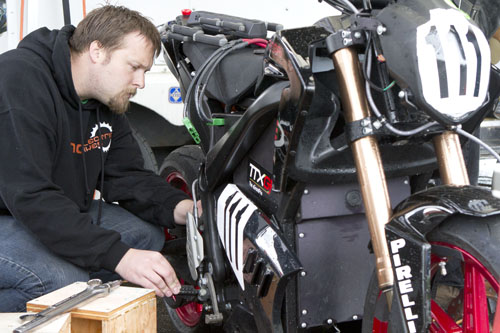Electric motorcycles raced against each other at Portland International Raceway over the weekend, but the results of the races were secondary to the movements and ideas they represented.
Racing goes green
Electric motorcycles raced against each other at Portland International Raceway over the weekend, but the results of the races were secondary to the movements and ideas they represented.

The Electric Vehicle Live Festival featured a number of new motor vehicle technologies on display, and prominent energy conservation experts advertised their products and ideas. Representatives from EV Roadmap, Drive Oregon, Clean Cities, West Coast Electric Highway, Manzanita Micro and a number of motorcycle manufacturing companies were on hand for the festivities. The fair was part of the Oregon Motorcycle Road Racing Association’s 2012 schedule of events, running from their season opener in April to the season finale in October.
The main attraction was not the races themselves but the technology used in them. Advertisements for the event stressed the new electric vehicles displayed during the festival, describing their unlimited torque and sustainable innovation while deeming them the next generation of transportation.
The worldwide movement toward electric vehicles and other alternative forms of fuel was described in the fair’s advertisements as “inevitable,” and the alternative energy company representatives at the races certainly believe this to be the case. Electric vehicles saw successful sales in 2011, their first year of mass production for a wide consumer base, and are expected to grow in popularity in the coming years.
“When hybrids first came out in 2000, that first generation only sold 9,300 in the first year. Electric vehicles sold over 17,000 in their first year, to put that in perspective,” said Rick Wallace of the Oregon Department of Energy.
The main worry of electric vehicle manufacturers is consumer attitude and whether or not people will be willing to purchase a new kind of vehicle they may be unfamiliar with. Wallace insisted that, along with infrastructure needs and market demand, changing consumer attitudes would be the hardest part about making electric vehicles popular for the masses.
Still, various motorcycle riders at the event felt no antipathy or hesitation toward the new vehicles, and even pointed out their strengths compared to standard motorcycles.
“They’ve got unlimited torque. They’re similar in style to a two-stroke,” said Tony Porter of Kawasaki, who has been racing motorcycles for 15 years. “Stick me on it, and I’ll go as fast as I can on it.”
The vehicles offer other benefits as well: “They’re impressive. It’s definitely neat not to hear noise when you race,” said Mark DeGross, also of Kawasaki, who has been racing for 11 years. “You’ve got to get used to it, though. As a rider, it’d be a fun challenge to try racing one.”
Electric vehicle representatives, while cautiously optimistic about the marketability of their products, were extremely passionate about their work and their cause and believed strongly in the vision of electric transportation. The festival served as a step in an innovative direction for alternative transportation technology.
“We envision a consensus community for alternative energy,” said Julie Peacock of the Oregon Department of Energy. “The best way is to make each coalition unique. It’s a great way to have community-based outreach. We’re currently working on the Energy Oregon grant, which will help with community outreach and marketing.”
“On the West Coast, we’re doing much better than other parts of the country,” Wallace said. “The problem is, we’re a small market, so it’s difficult for us to drive change ourselves. But we are the most electric-vehicle-ready market. The Oregon government is very positive on this technology and is allowing us to work on policies. The great thing about Oregon too is that alternative energy agencies work well together.”





